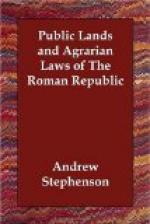[Footnote 7: Cicero, Ad Att., I,19: “Sentinam urbis exhaurire, et Italiae solitudinem frequentori posse arbitrabor.”]
[Footnote 8: Momm., I, 145.]
[Footnote 9: Marquardt u. Momm., IV, 35-51; Momm., History of Rome, I, 108, 539; Madvigi Opuscula Academica, I, 208-305.]
[Footnote 10: Marquardt u. Momm., IV, 35-51; Ihne, vols. I-V; Momm., vols. I-V; Madvigi Opus., loc. cit.]
CHAPTER II.
Sec. 5.—Lex Cassia.
Every year added to the difference between the patrician and plebeian, the rich and the poor; a difference which had now grown so great as to threaten seriously the very existence of the state. The most sagacious of all the plans which had been proposed to stop this evil, was that set forth by Spurius Cassius, a noble patrician now acting as consul for the third[l] time. In the year 268, he submitted to the burgesses[2] a proposal to have the public land surveyed, that portion belonging to the populus set aside and the remainder divided among the plebeians or leased for the benefit[3] of the public treasury.
He thus attempted to wrest from the senate the control of the public land and, with the aid of the Latini and the plebeians, to put an end to the system of occupation.[4] The lands which he proposed to divide were solely those which the state had acquired through conquest since the general assignment by king Servius, and which it still retained.[5] This was the first measure by which it was proposed to disturb the possessors in their peaceful occupation of the state lands, and, according to Livy, such a measure had never been proposed from then to the time in which he was writing, under Augustus, without exciting the greatest disturbance.[6] Cassius might well suppose that his personal distinction and the equity and wisdom of the measure would carry it through, even amidst the storm of opposition to which it was subjected. Like many other reformers equally well meaning, he was mistaken.
The citizens who occupied this land had grown rich by reason of its possessions. Some of them received it as an inheritance, and doubtless looked upon it as their property as much as the Ager Romanus. These to a man opposed the bill. The patricians arose en masse. The rich plebeians, the aristocracy of wealth, took part with them. Even the commons were dissatisfied because Spurius Cassius proposed in accordance with federal rights and equity to bestow a portion of the land upon the Latini and Hernici, their confederates and allies.[7] The bill proposed by Cassius, together with such provisions as were necessary, became a law, according to Niebuhr,[8] because the tribunes had no power to bring forward a law of any kind before the plebeian tribes obtained a voice in the legislature by the enactment of the Publilian law in 472 B.C.; so that when they afterwards made use of the agrarian law to excite the public passions




